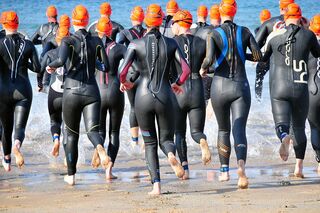Motivation
Inside the Tri-Mind: Mental Assessment for Triathlon
Know your triathlon mental strengths and areas in need of improvement.
Posted September 2, 2020

One of the most difficult aspects of the mental side of triathlon is that it can’t be seen, quantified, or measured directly. With the physical components of triathlon, you can readily see the areas in need of improvement by, for example, the amount of weight you lift or the number of reps you do in the gym, or your times in the pool, on the track, and on the road. As a result, it’s harder to gauge your strengths and weaknesses psychologically, what areas you need to work on, and any progress you make mentally. Though every triathlete will say that the mind is essential, this lack of clarity makes it more difficult to appreciate, commit to, and gain the benefits of mental training.
Mental Performance Assessment
By taking my Mental Performance Assessment (MPA), what I call “physical testing for the mind,” you can make your triathlon-related mental capabilities as concrete and objective as possible. My MPA is based on an assessment method known as Performance Profiling that is a simple and scientifically proven way to measure your mental strengths and areas in need of improvement related to your triathlon participation.
My MPA offers several important benefits. First, though you likely know that the mind plays a big role in your triathlon efforts, you may not know precisely what areas are most important. The MPA educates you on the mental areas that I deem essential for triathlon performance. Second, it also helps you understand where you fit into these crucial areas, that is, what your strengths and weaknesses are. Finally, the information you gain from the MPA can be used to create a mental training program that can become a part of your overall training regimen.
Perspective on Assessment
In developing a greater understanding of your triathlon capabilities, you must recognize and acknowledge your strengths and your weaknesses. Most triathletes love to focus on their strengths but don’t like to admit that they have weaknesses. This attitude will limit your progress because most athletes think that they’re as good as their greatest strengths. For example, one triathlete who is a stronger cyclist may believe that this strength will carry her to her race goals. The truth is, however, that you are only as fast as your biggest weakness. For this triathlete, her slow swimming will hold her back.
Think of your triathlon strengths and weaknesses as a mathematical equation. On a scale of 1-10, where a 1 is very poor and 10 is the best, for the triathlete I just described, who is a strong biker (8) but a poor swimmer (2), her overall performance would be moderate (8+2=10). If she focused on and improved her cycling (from 8 to 9), she wouldn’t get much faster overall because there isn’t much room for improvement (9+2=11). But if she focused on and improved her swimming (from 2 to 7), her overall performance would rise significantly (8+7=15). Of course, you want to continue to build your strengths, but the more you improve your weaknesses, the higher your overall performances, and the more successful you will be.
It’s important for you to have an open mind when take the MPA. Rather than being uncomfortable with facing your weaknesses, you should be willing to consider the information in a positive and constructive way. When weaknesses are identified, it doesn’t mean that you’re incapable of performing well. It may be that you haven’t had to use these capabilities at your current distance or you’ve been able to hide them with the strengths you have. But the information you gain from my MPA will enable you to improve and you’ll have a better chance of achieving your goals.
Take the Mental Performance Assessment
I have identified eight mental, emotional, and performance factors that I believe are important to triathlon success. To take the MPA, rate yourself on a 1-to-10 scale for each of the 8 factors listed below.
- Motivation. How determined you are to train and race to achieve your competitive goals; are you doing the work necessary to succeed? (1-not at all; 10-very).
- Confidence. How strongly you believe in your ability to race your fastest and achieve your competitive goals (1-no belief; 10-total belief).
- Intensity. Whether your physical intensity helps (relaxed and energized) or hurts (gets too nervous) your race performances (1-hurts, anxious; 10-helps, relaxed).
- Focus. How well you’re able to pay attention to what will help you perform your best and avoid distractions that hurt your performances (1-totally distracted; 10-totally focused).
- Emotions. Whether you experience negative emotions (e.g., fear, frustration, anger, worry) and they hurt your training or race efforts or you experience positive emotions (e.g., inspiration, excitement, joy, pride) and they help you perform well (1-negative, hurt; 10-positive, help).
- Preparation. How ready you are to perform your best and achieve your competitive goals on race day (1-not at all prepared; 10-very prepared).
- Consistency. How well you’re able to maintain a high level of performance in races and throughout the season (1-very inconsistent; 10-very consistent).
- Adversity. How you respond to difficulties you’re faced with in races with such as bad weather or tough course conditions (1-poorly; 10-well).
Evaluating Your MPA Results
Having completed the MPA, you now have a more clear and tangible understanding of your mental strengths and weaknesses in your endurance sport. Scores below 7 indicate areas that you need to work on. Write down the factors that you need to address, set goals related to improving those areas, and decide how you will develop the areas. Then consistently work on them until you have strengthened them and elevated your training and race performances.
Much like physical testing, the MPA should be completed every few months to evaluate your progress and adjust your mental training program. With time and effort, you can develop your mental strengths and alleviate your weaknesses so you can achieve Prime Triathlon.


